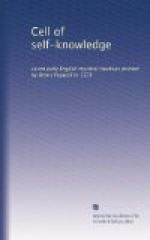A TREATISE NAMED BENJAMIN
THE PROLOGUE
A great clerk that men call [25] Richard of Saint Victor, in a book that he maketh of the study of wisdom, witnesseth and saith that two mights are in a man’s soul, given of the Father of Heaven of whom all good cometh. The one is reason, the other is affection; through reason we know, and through affection we feel or love.
Of reason springeth right counsel and ghostly wits; and of affection springeth holy desires and ordained[26] feelings. And right as Rachel and Leah were both wives unto Jacob, right so man’s soul through light of knowing in the reason, and sweetness of love in the affection, is spoused unto God. By Jacob is understanden God, by Rachel is understanden reason, by Leah is understanden affection. Each of these wives, Rachel and Leah, took to them a maiden; Rachel took Bilhah, and Leah took Zilpah. Bilhah was a great jangler, and Zilpah was ever drunken and thirsty. By Bilhah is understanden imagination, the which is servant unto reason, as Bilhah was to Rachel; by Zilpah is understanden sensuality, the which is servant unto affection, as Zilpah was to Leah. And so much are these maidens needful to their ladies, that without them all this world might serve them of nought. For why, without imagination reason may not know, and without sensuality affection may not feel. And yet imagination cryeth so inconveniently[27] in the ears of our heart that, for ought that reason her lady may do, yet she may not still her. And therefore it is that oft times when we should pray, so many divers fantasies of idle and evil thoughts cry in our hearts, that on no wise we may by our own mights drive them away. And thus it is well proved that Bilhah is a foul jangler. And also the sensuality is evermore so thirsty, that all that affection her lady may feel,[28] may not yet slake her thirst. The drink that she desireth is the lust of fleshly, kindly, and worldly delights,[29] of the which the more that she drinketh the more she thirsteth; for why, for to fill the appetite of the sensuality, all this world may not suffice; and therefore it is that oft times when we pray or think on God and ghostly things, we would fain feel sweetness of love in our affection,[30] and yet we may not, for are we so busy to feed the concupiscence of our sensuality; for evermore it is greedily asking, and we have a fleshly compassion thereof. And thus it is well proved that Zilpah is evermore drunken and thirsty. And right as Leah conceived of Jacob and brought forth seven children, and Rachel conceived of Jacob and brought forth two children, and Bilhah conceived of Jacob and brought forth two children, and Zilpah conceived of Jacob and brought forth two children; right so the affection conceiveth through the grace of God, and bringeth forth seven virtues; and also the sensuality conceiveth through the grace of God, and bringeth forth two virtues; and also the reason conceiveth through the grace of God, and bringeth forth two virtues; and also the imagination conceiveth through the grace of God, and bringeth forth two virtues, or two beholdings. And the names of their children and of their virtues shall be known by this figure that followeth:




